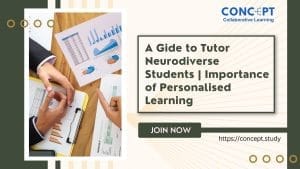
A Gide to Tutor Neurodiverse Students | Importance of Personalised Learning
Neurodiversity is a term that encompasses a range of neurological conditions, including autism, ADHD, and dyslexia. As educators and tutors, it’s essential to understand and address the unique needs of neurodiverse students. This article explores the significance of personalized learning in tutoring neurodiverse students and offers insights into effective strategies for a more inclusive educational experience.
Introduction
In the diverse landscape of education, neurodiversity highlights the variety of neurological differences among individuals. As tutors, our role goes beyond conventional teaching methods, especially when working with neurodiverse students. Understanding the challenges they face and embracing personalized learning is crucial for fostering a positive and effective learning environment.
01. Understanding Neurodiversity
Neurodiversity celebrates neurological differences and acknowledges that conditions like autism, ADHD, and dyslexia are natural variations of the human brain. It emphasizes the importance of acceptance and inclusion, challenging the notion that these conditions are disorders that need to be fixed.
02. Challenges Faced by Neurodiverse Students
Neurodiverse students encounter various challenges, including academic difficulties, social struggles, and emotional hurdles. Traditional teaching methods often fail to address their specific needs, leading to frustration and disengagement.
03. Traditional Tutoring vs. Personalized Learning
Traditional tutoring methods follow a one-size-fits-all approach, which may not be suitable for neurodiverse students. Personalized learning, on the other hand, tailors teaching to individual learning styles, accommodating diverse needs and promoting a more effective learning experience.
Benefits of Personalized Learning for Neurodiverse Students
The advantages of personalized learning for neurodiverse students are profound. By customizing lesson plans and incorporating diverse teaching methods, tutors can enhance engagement, boost confidence, and unlock the full potential of each student.
- Strategies for Personalized Tutoring
Implementing personalized online tutoring involves creating individualized lesson plans, employing multi-sensory teaching approaches, and integrating adaptive technology. These strategies cater to different learning styles, ensuring neurodiverse students receive the support they require.
The Role of Empathy in Tutoring Neurodiverse Students
Empathy is a cornerstone in tutoring neurodiverse students. By understanding their unique needs and challenges, tutors can create a supportive and inclusive learning environment that fosters growth and development.
- Incorporating Neurodiversity into Mainstream Education
Promoting inclusivity in education involves breaking down stigmas and stereotypes associated with neurodiverse conditions. By advocating for inclusive practices, we contribute to creating an environment where every student feels accepted and valued. A revision guide for GCSE Maths 2024
- Training for Educators and Tutors
To effectively tutor neurodiverse students, educators, and tutors should undergo specialized training. Resources for professional development play a crucial role in equipping tutors with the knowledge and skills needed to cater to diverse learning needs.
- Parental Involvement in Personalized Learning
Collaboration between parents and tutors is vital for the success of personalized learning. Establishing open communication and creating a supportive home environment ensures that students receive consistent support in and out of the classroom.
- Measuring Success in Neurodiverse Tutoring
Traditional assessment methods may not accurately reflect the progress of neurodiverse students. Implementing alternative assessment methods and celebrating small victories are essential for recognizing and measuring success in neurodiverse tutoring.
- Overcoming Common Misconceptions
Addressing myths and misconceptions about neurodiversity is crucial for fostering understanding and acceptance. By dispelling stereotypes, we contribute to creating a more inclusive society that embraces diversity in all its forms.
Future Trends in Neurodiverse Education
The field of neurodiverse education is evolving, with ongoing research and advancements in teaching methodologies. Staying informed about these trends ensures that educators and tutors can adapt their approaches to provide the best possible support for neurodiverse students.
Conclusion
In conclusion, personalized learning is a game-changer in the education of neurodiverse students. By recognizing and embracing neurodiversity, implementing tailored teaching methods, and fostering empathy, tutors can make a significant impact on the academic and personal development of their students. Enroll for Online GCSE Science Courses
FAQs
Q. Is personalized learning only beneficial for neurodiverse students?
Personalized learning benefits students of all abilities by catering to individual learning styles.
Q. How can parents actively support personalized learning at home?
Parents can support personalized learning by maintaining open communication with tutors and creating a conducive home environment.
Q. Are there specific resources for tutors to enhance their understanding of neurodiversity?
Yes, there are various training programs and resources designed to help tutors understand and support neurodiverse students better.
Q. What role does technology play in personalized learning for neurodiverse students?
Technology can be a valuable tool, providing adaptive resources and aiding in multi-sensory learning experiences.
Q. How can educators promote neurodiversity awareness in mainstream schools?
Educators can advocate for inclusive practices, organize awareness campaigns, and incorporate neurodiversity into the curriculum.
